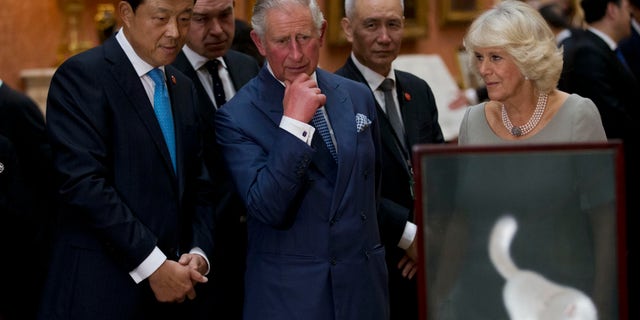NEWYou can now listen to Fox News articles!
King Charles III’s ascension to the throne is likely to bring little change to the United Kingdom as the former Prince of Wales will need to assume a different demeanor to suit his new role.
Queen Elizabeth II passed away Thursday at Balmoral Castle in Scotland. Her 73-year-old son, Charles, immediately ascended to the throne following his mother’s death and that comes with some new restrictions he will need to observe.
“Prince Charles is clearly different to King Charles,” Alan Mendoza, executive director of the Henry Jackson Society, told Fox News Digital. “If there’s one thing that the queen would have imparted to her son and heir repeatedly and by her own example … it’s that she was inscrutable when it came to decisions.”
As the Prince of Wales, Charles criticized climate change — even writing a book, “Climate Change,” with Cambridge University climate scientist Emily Shuckburgh and former Friends of the Earth director Tony Juniper. He also targeted government subsidies for large-scale agriculture and encouraged organic and environmentally friendly food production.
QUEEN ELIZABETH II, LONGEST-REIGNING BRITISH MONARCH, DEAD AT 96
But as King Charles III, he will need to remain more modest in his opinions.
“Prince Charles in the past has been very vocal about his beliefs, and I think that King Charles will no doubt consider that he is now the monarch and, as a result, doesn’t have the luxury of having views,” Mendoza explained.
Queen Elizabeth II and Prince Charles in full court dress.
(Paul Edwards – WPA Pool/Getty Images)
“I suspect that having spent a long time apprenticing for this role, he will, of course, want to push certain causes … he’ll be a more activist monarch, say, than his mother, but I wouldn’t go as far as to say that he’s going to impart his views in the way that we might have thought he would do.”
Queen Elizabeth II famously displayed little of her personal opinions on matters, known as an inscrutable monarch who remained a mystery her whole life. A small crisis occurred in 1986 when the Sunday Times published a piece titled “Queen dismayed by ‘uncaring’ Thatcher,” claiming the queen disagreed with her prime minister and had made her opinion known — something the British constitution doesn’t allow as it could be understood as an attack on the government.
CHARLES BECOMES KING OF ENGLAND AFTER DEATH OF QUEEN ELIZABETH II
Charles will therefore have to walk a line and keep his views close to his chest as he finally sits on the throne.
Part of that is due to the fact the king is the de facto approval on anything the government does: any action taken by a prime minister or parliament is an action understood to have occurred with the monarch’s approval.

Britain’s Prince Charles, center, his wife, Camilla, Duchess of Cornwall, and Chinese ambassador to the U.K. Liu Xiaoming view a display of Chinese items from the Royal Collection at Buckingham Palace in London on Oct. 20, 2015.
(AP Photo/Matt Dunham, Pool, File)
“Every year there’s something called the Queen’s Speech or the King’s Speech given by the monarch at the Houses of Parliament: It’s obviously written by the government, but it’s significant that it’s the head of state saying what their government is going to be doing, basically,” Mendoza said.
But the monarch, while in practice has the ability to reject certain policies or ideas that the government puts forward, it’s still a power that has not been exercised for many years and unlikely to be anytime soon.
QUEEN ELIZABETH II DIES: WORLD LEADERS PAY TRIBUTE AFTER BRITISH MONARCH’S PASSING
Mendoza pointed to Boris Johnson’s effort to suspend government and then hold an election over Brexit: the queen could have refused the motion but ultimately did nothing.
“It would be highly unorthodox and highly unusual and would no doubt cause a constitutional crisis were a monarch to actually exercise this power,” he noted. “But technically they could do it.”

Prince Charles, Prince of Wales, climbs on the traversing wall in the new gym at Grainville Secondary School in Saint Helier, United Kingdom, on July 18, 2012. (Chris Jackson)
(2012 Getty Images)
King Charles III will still have an outlet of influence through his weekly meetings with his prime minister, when they discuss the government’s recent progress and the monarch is free to express views on government matters. Those conversations will remain private.
But Charles has served as the Prince of Wales for decades: world leaders know him and his views remain largely a matter of public record, so, even if he does keep quiet on issues now, the prime minister and world leaders will have some sense of his thinking.
CLICK HERE TO GET THE FOX NEWS APP
Mainly, Britain will see the national anthem change to “God Save the King” and new banknotes with King Charles III’s face will be issued, but the public should not expect Charles to become “restless,” according to Mendoza.
The Associated Press contributed to this report.